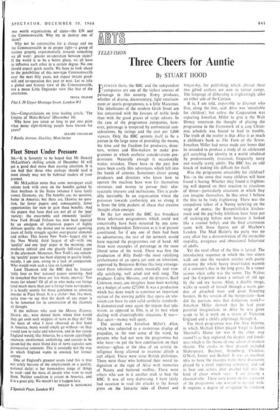Fleet Street Under Pressure
sm,--It is fervently to be hoped that Mr Donald McLachlan's chilling article of December 16 will get a good deal more than passing attention. It is too bad that those who perhaps should read it most closely may not be habitual readers of your journal.
Mr McLachlan notes that some newspaper craft unions look with envy on the benefits gained by their brethren in the States (whence I have lately come), Germany, etc. The benefits are, no question, better in America; but there are, likewise no ques- tion, far fewer papers and, consequently, fewer opportunities for men to gain these benefits. And the papers that have died are not all of the 'pop' variety: the once-noble and eminently 'quality' New York Herald Tribune has now been ingested by an amalgam of afternoon papers of highly dubious quality, the dismal end to several agonising years of futile struggle against ever-greater demands and strikes. This leaves New York—largest city in the New World, third largest of all—with one 'quality' and one 'pop' paper in the morning; one mediocre tabloid and one ghastly full-sized paper in the afternoon. Moreover, New York's one remain- ing 'quality' paper has been slipping in quality lately, mainly, I am sure, owing to a lack of competition. Who would wish such a fate on London?
Lord Thomson told the BBC that he foresaw 'only four or five' national papers surviving. And he remarked that there are 'too many, anyway.' Too many for whom? Of all of us who make our livings (and much more than just a living) from newspapers, it is hardly seemly for those gentlemen to advocate murder in Fleet Street. It is a cliché—but, like most, quite true—to say that the death of any paper is to be lamented for its constriction of the channels of thought.
If the millions who read the Mirror, Express, Sketch, etc., were denied them, where then would they get even such snippets of news as they do? On the basis of what I have observed at first hand in America, many would simply go without—or they would turn to radio and television, and in due course England would, like America, be a nation appallingly unaware, uninformed, unthinking. and content to be spoon-fed the most bland diet of news capsules sans provocative comment. This is assuredly not the way in which England wants to emulate her former colony.
One of England's greatest assets (and this is true not solely because of my employment on a quality, national daily) is her tremendous range of things to read--and the mass of people who want to read them. Neither condition is extant in America, and it is a great pity. We mustn't let it happen here.
PHILLIP T. BANGSBERG
2 Spanish Place, London W






































 Previous page
Previous page